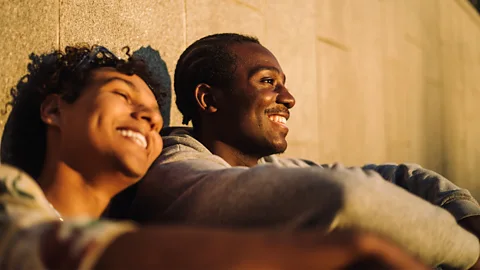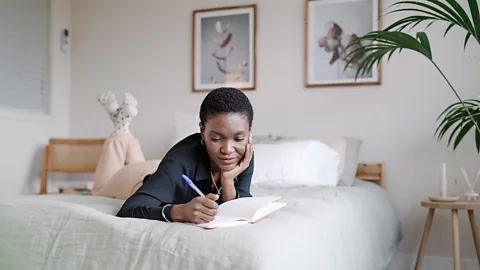The small exercise that's a powerful mood booster
 Getty Images
Getty ImagesCounting our blessings is an age-old piece of advice – but it turns out that writing lists of good things that happen to us actually does help improve our mood.
Of all the interventions brought to us by psychological research, I think this is probably my favourite. It's both simple and well-evidenced. And as such, it has become well-known.
There are various names for it – three good things, three blessings or a gratitude list. There are variations too in the exact instructions given, but essentially the exercise involves spending a few moments in the evening reflecting on your day, then writing down three things that went well or that you enjoyed. The final element is to think about why these things felt positive to you. You can choose anything, however small and seemingly inconsequential. Perhaps you bumped into a friend you hadn’t seen for a while? Perhaps you and a colleague laughed about something together. Perhaps you enjoyed your walk home from the station in lovely early evening light.
Alternatively, you could include something much more significant, perhaps even life-changing. Like passing an important exam, or getting a promotion, or hearing that a relative is going to have a baby.
 Getty Images
Getty ImagesCounting your blessings is of course a very old idea, and exercises of this kind had been used clinically for some time. The initial research investigating whether any of us might use this method in everyday life to improve our wellbeing was published in 2005 by Martin Seligman and Chris Peterson, two major figures in the field of positive psychology.
The study involved 577 people who were randomly assigned to different groups. As a placebo, one group had to write every evening about their early memories from childhood. Other groups were given different interventions to try out. In the arm of the trial that interests us, people were asked to list three things that had gone well that day and what caused them to go well. Over the next few months, the volunteers in all the groups were given scales to measure their happiness.
The results were impressive. Notably, within a month, the people who were assigned the three good things task began to show improvements in their happiness levels as well as a decrease in depressive symptoms – with the positive effects lasting for the six months of the study.
Meanwhile those in the placebo group saw a brief spike in happiness in the first week, but their mood soon returned to baseline, and there was no change at the six month follow up.
Since 2005, this technique has been tested with all sorts of different people, from teenagers in slums of Nairobi, Kenya to older women living in Switzerland.
One reason that the three good things strategy can work is because it begins to counter the hard-wired tendency we have as humans to register and remember the negative rather than the positive. There's a strong evolutionary reason why we think this way: it's vital for our survival. So, we hardly notice if a small cat is following us up the street, but if it was a lion we certainly would. Our brains are primed for danger in order to keep us safe. Which is fine, except that in a world of war and suffering, hatred and division – all of which we can instantly access on our phones – this negativity bias can overwhelm us.
An important element of the three good things exercise is that it helps us to focus on the positive in a concrete way. And although I've been suggesting it's an end-of-the-day exercise, its real strength lies in the fact that the impact soon begins to spread through the day. You find yourself searching out good things to add to your list from the moment you get up. (Whenever I get my favourite seat at the front of the top deck of the bus I think to myself, that's one for my list. How lucky!) And before you know it you are training yourself not only to look out for threats, but for good things too.
 Getty Images
Getty ImagesToday I had a surprise lunch out with my husband when he suggested going to the café which I constantly walk past and wonder about but have never visited. And I was pleased to see that although it's winter my yellow and red dahlia had even more new blooms than yesterday. Then a little later, an academic I had emailed in the US to ask about some psychological research replied to me within the hour, kindly sending me two very useful journal articles. It's mid-afternoon as I write this article, and I already know what my three good things for today are. Once you start it becomes a habit to look out for these moments.
It's true of course that when you are going through very tough times, those positive moments might be harder to find. This is not going to transform your life, but a 2021 meta-analysis of studies found that it could be effective, even when people had depression.
That doesn't mean of course it will work for every individual. When teenagers in India, for example, tried it out, they tended not to find that it useful. The researchers speculated that with the country's schools having such a strong focus on written work, the exercise might have felt like yet another piece of homework to complete.
But with these kinds of interventions – which cost nothing and take very little time – it can be worth a try to see whether they work for you. Or even to hold it in your arsenal as a strategy to try in the future if you're feeling unhappy with life.
Personally, I found this technique especially helpful to get through the longest lockdown of the Covid-19 pandemic. True, my end-of-the-day list lacked variety: walks around my local park and tasty meals at home featured regularly. But even so, seeking out the positive did lift some of the gloom.
--
If you liked this story, sign up for The Essential List newsletter – a handpicked selection of features, videos and can't-miss news, delivered to your inbox twice a week.
For more science, technology, environment and health stories from the BBC, follow us on Facebook, X and Instagram.
